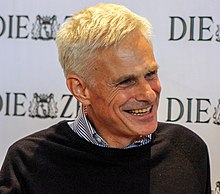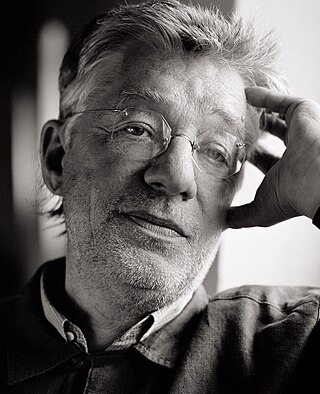
Rainald Maria Goetz (born 24 May 1954, in Munich) is a German author, playwright and essayist.

Rainald Maria Goetz (born 24 May 1954, in Munich) is a German author, playwright and essayist.
After studying History and Medicine in Munich and earning a degree (PhD and M.D) in each, he soon concentrated on his writing.
His first published works, especially his novel Irre ("Insane"), published in 1983, made him a cult author of the intellectual left. To the delight of his fans and the dismay of some critics, he mixed neo-expressionist writing with social realism in the vein of Alfred Döblin and the fast pace of British pop writers such as Julie Burchill. During a televised literary event in 1983, Goetz slit his own forehead with a razor blade and let the blood run down his face until he finished reading. [1]
Goetz has the reputation of an enthusiastic observer of media and pop culture. He has embraced avant-garde [ citation needed ] philosophers such as Foucault and Luhmann as well as the DJs of the techno movement, especially Sven Väth. [2]
He kept a blog in 1998–99 called Abfall für alle ("rubbish for everybody"), which was later published as a book.
Goetz has won numerous literary awards.

Botho Strauss is a German playwright, novelist, and essayist.

Elfriede Jelinek is an Austrian playwright and novelist. She is one of the most decorated authors to write in German and was awarded the 2004 Nobel Prize in Literature for her "musical flow of voices and counter-voices in novels and plays that, with extraordinary linguistic zeal, reveal the absurdity of society's clichés and their subjugating power". She is considered to be among the most important living playwrights of the German language.

George Tabori was a Hungarian writer and theatre director.

The Georg Büchner Prize is the most important literary prize for German language literature. The award is named after dramatist and writer Georg Büchner, author of Woyzeck and Leonce and Lena. The Georg Büchner Prize is awarded annually for authors "writing in the German language who have notably emerged through their oeuvre as essential contributors to the shaping of contemporary German cultural life".

Terézia Mora is a German Hungarian writer, screenwriter and translator.
Hermann Karl Lenz was a German writer of poetry, stories, and novels. A major part of his work is a series of nine semi-autobiographical novels centring on his alter ego "Eugen Rapp", a cycle that is also known as the Schwäbische Chronik.
The Heinrich-Böll-Preis is a literary prize of Germany, awarded by the City of Cologne in memory of Nobel Prize winner Heinrich Böll. The prize money is €30,000. The prize is awarded "for outstanding achievements – even by still unknown authors – in the field of German-language literature".
Kranichsteiner Literaturpreis is a literary prize of Germany. The Deutsche Literaturfonds based in Darmstadt has been awarding the prize since 1983. The prize money was raised in 2019 from €20,000 to €30,000. In addition to the main prize, the Kranichsteiner Literaturförderpreis is also awarded. In 2020 the Deutsche Literaturfonds renamed the prize to Großer Preis des Deutschen Literaturfonds and the prize money has been raised to €50,000. It is awarded for an outstanding literary work, taking into account the current book.

Reinhard Jirgl is a German writer.
Mülheimer Dramatikerpreis, founded in 1976, is one of the leading theater awards in Germany. It is awarded by an open jury of theater professionals, critics and playwrights who watch a short list of productions during the Stücke festival; the productions are not the full play but a piece, often the first act. The short list is chosen by a jury from plays that were first performed in Germany during the prior season. The winner receives €15,000.

Hanns-Josef Ortheil is a German author, scholar of German literature, and pianist. He has written many autobiographical and historical novels, some of which have been translated into 11 languages, according to WorldCat: French, Dutch, Modern Greek, Spanish, Chinese, Lithuanian, Japanese, Slovenian, and Russian.

Kathrin Röggla is an Austrian writer, essayist and playwright. She was born in Salzburg and lives in Berlin since 1992 but moved to Cologne in 2020. She has written numerous prose works, including essays, as well as dramas and radio plays. For her literary works, she has won a wide range of awards.

Dea Loher is a German playwright and author.

Urs Widmer was a Swiss novelist, playwright, an essayist, and a short story writer.

Ulrike Draesner is a German author. She was awarded the 2016 Nicolas Born Prize.
The Wilhelm Raabe Literature Prize is a German literary award established in 2000 by the city of Braunschweig and the radio broadcaster Deutschlandradio. It is named after the 18th-century writer Wilhelm Raabe and is awarded for an individual work. The prize sum is €30,000, making it one of the most significant German literary awards after the Georg Büchner Prize and the Joseph-Breitbach-Preis.
Zsuzsanna Gahse is a Hungarian-born German-language writer and translator who lives in Switzerland.

Lukas Bärfuss is a Swiss writer and playwright who writes in German. He won the Georg Büchner Prize in 2019.
Since 1993, the Else Lasker-Schüler Dramatist Prize has been awarded by the Pfalztheater Kaiserslautern on behalf of the Rhineland-Palatinate Foundation for Culture. The prize is named after expressionist poet Else Lasker-Schüler (1869–1945). It is endowed with €10,000, one of the most highly endowed playwright prizes in Germany. The award ceremony at the opening of the Theatertage Rheinland-Pfalz in the Pfalztheater or Staatstheater Mainz is carried out by the Prime Minister of Rhineland-Palatinate. Additionally the Stückepreis is awarded for promoting young talents.
{{cite book}}: CS1 maint: location missing publisher (link)